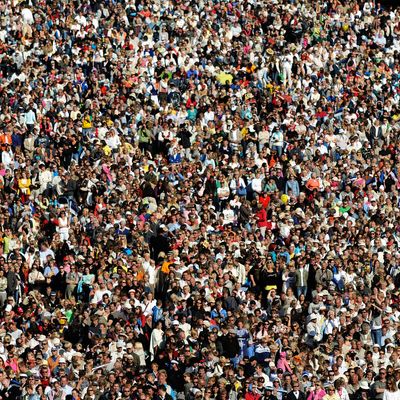
I have a new pre-movie routine: Before the theater lights go down and the previews begin, I note all of the places I could hide, if I had to. I often imagine myself diving under my seat or the row in front of me, wondering if one seems safer than the other. Sometimes, it starts before that. When I buy myself a movie ticket, I’ll think, “Is this the type of movie someone might hate so much that they’d shoot people over it?” As if that’s a question anyone could answer, or one worth thinking about in the first place. But I can’t stop.
Until recently, I wasn’t especially uncomfortable in crowds. But after a year full of what’s felt like back-to-back acts of mass violence here and abroad — in addition to the constant state of low-grade anxiety that has all but defined life in 2017 — something changed. And not just for me. “It’s kind of always on my mind,” my friend Chiara tells me. “I avoid trains at rush hour as much as I can, and definitely avoid, like, big crowded events.” She is so skittish, in fact, that she refuses to name specific public places that strike her as opportune targets for terrorism, not wanting to give anyone ideas. She knows that’s paranoid, and maybe also a little grandiose, but I knew exactly what she meant. I’ve had the same thoughts myself. My friend Caroline, however, gives me a brand-new way to worry in crowds. She tells me that whenever she’s in public, enclosed places, surrounded by lots of people, she looks around and asks herself, “What if these are the people I die with?”
Fear of crowds is known as ochlophobia, a term that’s historically been more associated with a form of social anxiety, or “the perceived presence of either too many people or intrusions into one’s personal space,” as described by Chalsa Loo in The Psychological Study of Crowding. The way we fear crowds and public places today is related, but different. Dr. Paula Panzer, psychiatrist and chief clinical and medical officer at the Jewish Board of Family and Children’s Services in New York City, says the fear of crowds is one facet of a larger sense of helplessness and lack of control felt by many of the patients she sees. “People are more vigilant and feel less in control of their safety,” she says. In a world many of us perceive as less safe (whether accurately or not), we want to know how to maintain some semblance of safety in everyday life, says Panzer.
I know, rationally speaking, that I am unlikely to fall victim to the type of violent attack I spend so much time worrying about. Earlier this year, NBC News reported that you’re significantly more likely to die by choking than by terrorist attack. To that statistic, and others like it, my response (and the response of many other anxious people, I suspect) is something like, “Yeah, but choking would be my fault.” It feels like something I can pretty successfully prevent with common sense.
Panzer says it’s exactly this perception of control that makes mundane, far likelier risks seem less scary, and the much less likely but far less predictable events so preoccupying. “We tend to get really focused and captivated by these really horrific rare events,” she says. “But how many people do you know who forget to look before they cross the street, or haven’t gotten their flu shot, or don’t put on a helmet when they get on a bike?” Panzer insists that she points these other risks out not to further frighten me, but to demonstrate that every one of us has coping mechanisms that we use to get through our daily anxieties, often without realizing that we’re doing so.
Most anxious people will be familiar with some of Panzer’s suggested coping strategies: taking deep, calming breaths; exercising regularly; talking to friends and family; even making fun of ourselves (“in a gentle, kind way,” she clarifies). Perhaps the most important thing we can do, though, is … nothing. If it wasn’t in your routine to look for exit signs in a concert hall or movie theater, says Panzer, don’t start now. If that’s who you were already, then fine.
“Don’t break your habit,” she says. “But don’t keep looking again and again, because that doesn’t relax you. It makes you feel worse, like by doing it you’re going to somehow protect yourself.” As with so much else in life, attaining the right blend of vigilance and cluelessness is a bit of a balancing act. Panzer adds that if your fears or anxieties are interfering with your behavior and/or your ability to function, it’s time to seek help from a therapist. But if you, like me, are just a bit more on edge in movie theaters or subway cars or concert halls than you’ve ever been before, you can start by taking a deep breath, and accepting that you can’t do much to prevent something very unlikely to happen in the first place. As Panzer reminds me, “We live with things beyond our control every day.” Unfortunately, endless worrying won’t change that. Believe me, I’ve tried.





